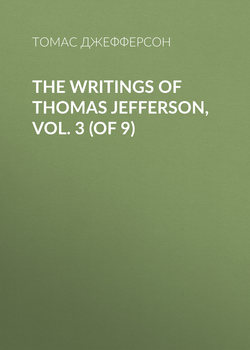Читать книгу The Writings of Thomas Jefferson, Vol. 3 (of 9) - Томас Джефферсон, Thomas Jefferson - Страница 12
PART II.—Continued.
LETTERS WRITTEN WHILE IN EUROPE.
1784-1790
TO JAMES MADISON
ОглавлениеParis, May 11, 1789.
Dear Sir,—My last to you was of the 15th of March. I am now in hourly expectation of receiving my leave of absence. The delay of it a little longer, will endanger the throwing my return into the winter, the very idea of which is horror itself to me. I am in hopes this is the last letter I shall have the pleasure of writing to you, before my departure.
The madness of the King of England has gone off, but left him in a state of imbecility and melancholy. They talk of carrying him to Hanover. If they do, it will be a proof he does not mend, and that they take that measure, to authorize them to establish a regency. But if he grows better, they will perhaps keep him at home, to avoid the question, who shall be regent? As that country cannot be relied on in the present state of its executive, the King of Prussia has become more moderate; he throws cold water on the fermentation he had excited in Poland. The King of Sweden will act as nobody, not even himself, can foresee; because he acts from the caprice of the moment, and because the discontents of his army and nobles may throw him under internal difficulties, while struggling with external ones. Denmark will probably only furnish its stipulated aid to Russia. France is fully occupied with internal arrangement. So that, on the whole, the prospect of this summer is, that the war will continue between the powers actually engaged in the close of the last campaign, and extend to no others; certainly, it will not extend, this year, to the southern States of Europe. The revolution of France has gone on with the most unexampled success, hitherto. There have been some mobs, occasioned by the want of bread, in different parts of the kingdom, in which there may have been some lives lost; perhaps a dozen or twenty. These had no professed connection, generally, with the constitutional revolution. A more serious riot happened lately in Paris, in which about one hundred of the mob were killed. This execution has been universally approved, as they seemed to have no view but mischief and plunder. But the meeting of the States General presents serious difficulties, which it had been hoped the progress of reason would have enabled them to get over. The nobility of and about Paris, have come over, as was expected, to the side of the people, in the great question of voting by persons or orders. This had induced a presumption that those of the country were making the same progress, and these form the great mass of the deputies of that order. But they are found to be where they were centuries ago, as to their disposition to keep distinct from the people, and even to tyrannize over them. They agree, indeed, to abandon their pecuniary privileges. The clergy seem, at present, much divided. Five-sixths of that representation consists of the lower clergy, who, being the sons of the peasantry, are very well with the Tiers Etat. But the Bishops are intriguing, and drawing them over daily. The Tiers Etat is so firm to vote by persons or to go home, that it is impossible to conjecture what will be the result. This is the state of parties, as well as we can conjecture from the conversation of the members; for, as yet, no vote has been given which will enable us to calculate, on certain ground.
Having formerly written to you on the subject of our finances, I enclose you now an abstract of a paper on that subject, which Gouverneur Morris communicated to me. You will be a better judge of its merit than I am. It seems to me worthy good attention.
I have a box of books packed for you, which I shall carry to Havre, and send by any ship bound to New York or Philadelphia. I have been so inexact as to take no list of them before nailing up the box. Be so good as to do this, and I will take with me my bookseller's account, which will enable us to make a statement of them. They are chiefly Encyclopedies, from the twenty-third to the thirtieth livraison. Paul Jones has desired me to send to yourself and Colonel Carrington each, his bust. They are packed together in the same box. There are three other boxes, with two in each, for other gentlemen. I shall send them all together, and take the liberty of addressing them to you. I rejoice extremely to hear you are elected, in spite of all cabals. I fear your post will not permit me to see you but in New York, and consequently but a short time only. I shall much regret this.
I am, with sentiments of sincere attachment and respect, dear Sir, your friend and servant.
